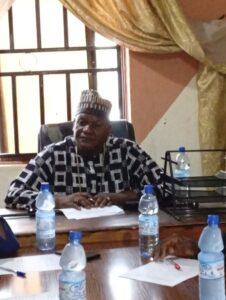In a state long marred by recurring episodes of violence—often rooted in farmer-herder tensions, communal disputes, and resource-based rivalries the notion of a peaceful Taraba within the next 10 years might seem far-fetched to some. But for Bishop Innocent Solomon, Chairman of the Taraba State Bureau for Peace and Conflict Management, it is not only a possibility, it is a vision within reach.
That optimism rang clear during a recent consultative meeting in Jalingo, the state capital, where Bishop Solomon addressed an influential mix of stakeholders: members of the Peace Architectural Dialogue (PAD), the Taraba Forum for Farmers-Herders Relations (TAFFAHR), civil society organizations, and non-governmental groups.
“We are not just hoping for peace; we are working for it every day,” the bishop declared, his voice steady with conviction. “There are dedicated experts, community leaders, and administrators actively involved in this process, and with their continued commitment, I believe violent conflict in our state will be a thing of the past within the next five to 10 years.”

The meeting, though routine in structure, was rich with symbolic meaning. It represented the growing synergy among actors from various sectors who are intent on building durable peace from the grassroots up.
At the heart of Taraba’s renewed peace drive is Governor Agbu Kefas, whose administration has made conflict resolution a central policy priority. Bishop Solomon lauded the governor’s proactive approach, noting that his government has appointed more aides focused on peace-building than any previous administration in the state’s history.
“This is not politics as usual,” Bishop Solomon said. “It’s a deliberate strategy to rebuild trust, resolve disputes through dialogue, and foster inclusion across communities that have felt marginalized or misunderstood.” This sentiment was echoed by Danaseli Buri, the special adviser to the governor on conflict resolution, who described the establishment of the peace bureau as both timely and strategic.
“Violence isn’t inevitable,” Buri said. “With the right structures in place and the political will to support them, we can transform conflict into cooperation.”
Related Articles:
- How an army commander is bridging the farmer-herder divide in Taraba
- Police nab two suspects, seize six firearms in Taraba Operation
The Bureau for Peace and Conflict Management operates on the principle that sustainable peace must be locally owned. Through collaborations with groups like PAD and TAFFAHR, the bureau has been rolling out dialogue forums, early-warning systems, and reconciliation processes that empower communities to resolve disputes before they escalate.
Bishop Solomon emphasized that the bureau is not merely reacting to violence, but building the kind of social architecture needed to prevent it. “We are fostering a culture where dialogue, not confrontation, is the first response,” he said. Perhaps the most powerful moment of the gathering came when representatives from attending organizations pledged their full support to the bureau’s mission. From community-based advocates to seasoned peace-building professionals, the consensus was clear, collaboration is the key.
“Our strength lies in unity,” said a representative from TAFFAHR. “If we continue to work hand-in-hand, there’s no reason Taraba can’t become a model for peaceful coexistence in Nigeria.” While the challenges are significant poverty, youth unemployment, and historical grievances among the various contending parties, Taraba’s peace initiative offers a rare glimmer of hope. With visionary leadership, grassroots engagement, and sustained political backing, the state may well chart a new course.
For Bishop Solomon and his team, the goal is clear: a Taraba where dialogue replaces division, and peace is more than just a dream it’s a shared reality. “We are laying the foundation today,” Solomon said. And in the years to come, generations will live in a Taraba free from the shadow of violence.”